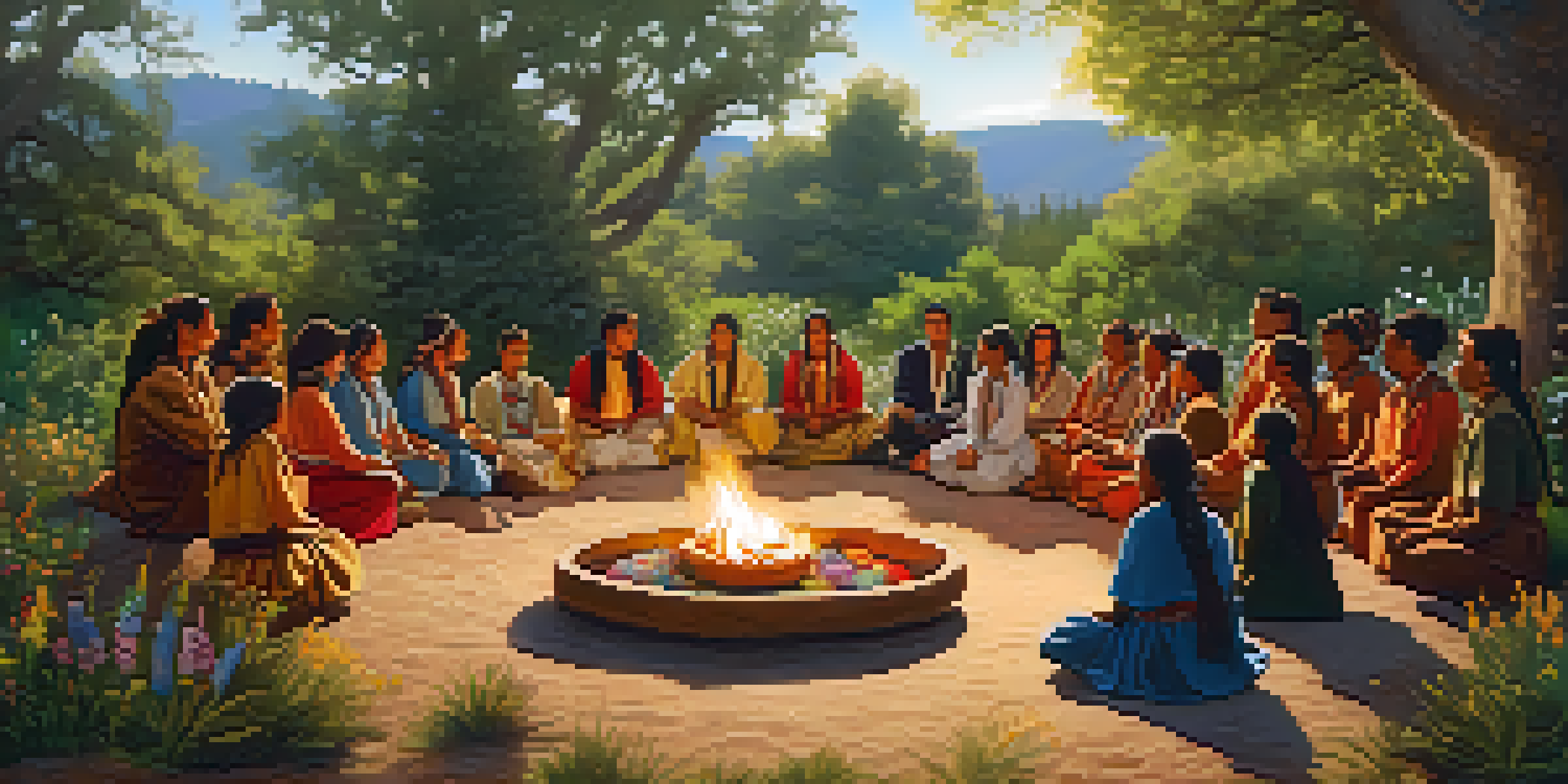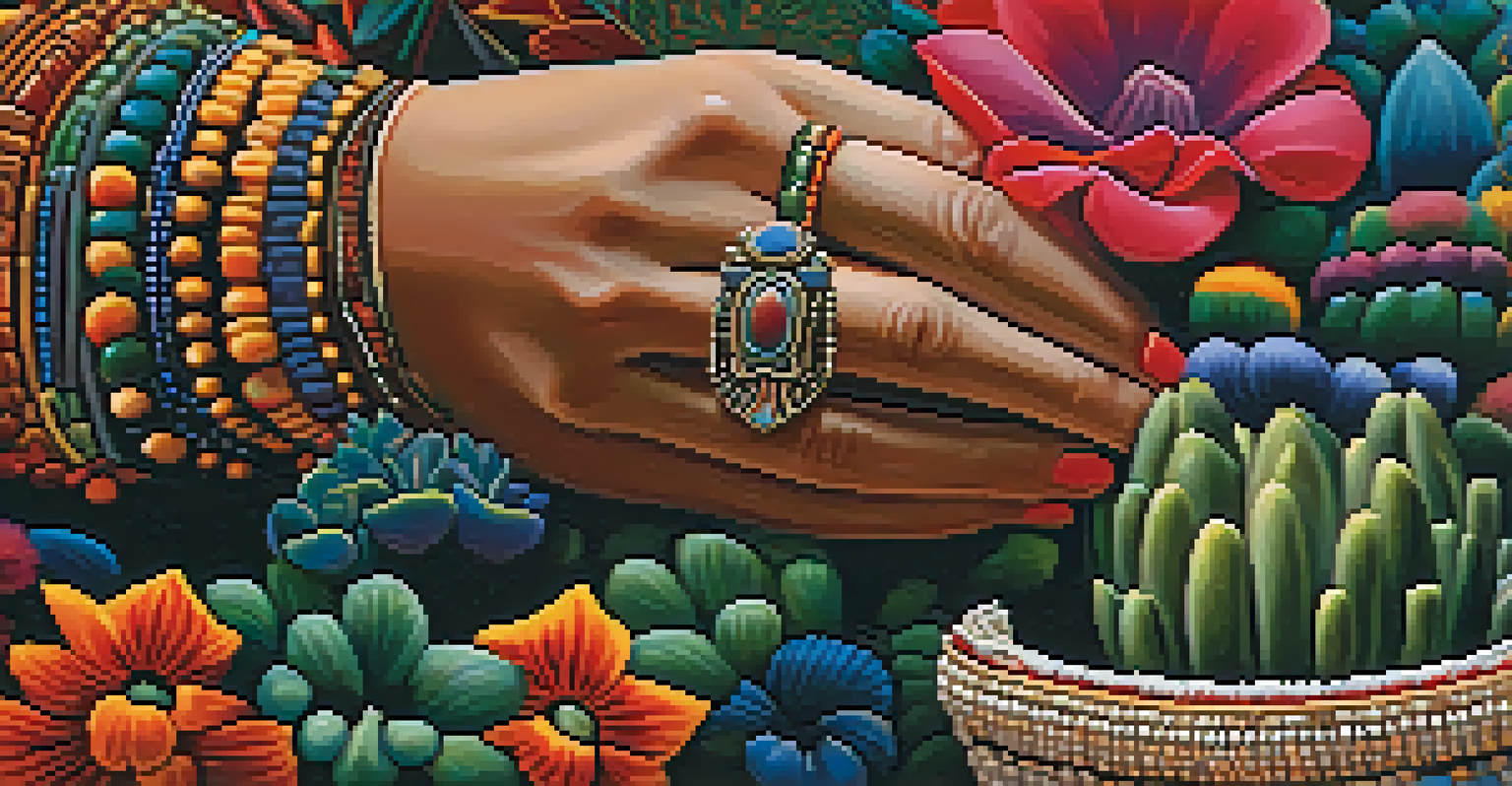The Role of Ancestors in North American Peyote Cultures

Understanding Peyote and Its Cultural Significance
Peyote, a small cactus containing the psychoactive compound mescaline, has been used for centuries in various Native American cultures. It is not just a substance for recreation but a sacred plant that plays a crucial role in spiritual rituals and healing practices. The use of Peyote is often tied to a deeper understanding of life, death, and the connection to one's ancestors.
The ancestors are always with us, guiding our steps and illuminating our paths.
In many Indigenous cultures, Peyote serves as a bridge between the physical and spiritual worlds, allowing practitioners to communicate with their ancestors. This connection fosters a sense of belonging and continuity, as individuals seek guidance and wisdom from those who came before them. Such practices highlight the importance of ancestral knowledge in navigating contemporary challenges.
Moreover, Peyote ceremonies often include songs, prayers, and storytelling, which are rich in historical significance. These elements not only honor the ancestors but also educate younger generations about their heritage. In this way, Peyote is not merely a plant; it is a vessel for cultural preservation and identity.
Ancestral Spirits: Guides in Peyote Journeys
In Peyote ceremonies, participants often invoke the presence of their ancestors, seeking their guidance throughout the experience. This spiritual connection is believed to enhance the healing properties of Peyote, as ancestral spirits provide insight and clarity. Many participants report feeling a profound sense of comfort and support, reinforcing their belief in the interconnectedness of all life.

For example, during a Peyote ceremony, a participant might receive messages or visions that are interpreted as advice from an ancestor. These messages can address personal struggles, family issues, or broader community concerns. This interaction emphasizes the idea that ancestors are always present, offering wisdom and encouragement to those who seek it.
Peyote's Spiritual and Cultural Role
Peyote serves as a sacred plant in Indigenous cultures, facilitating spiritual rituals and fostering connections to ancestors.
The reverence for ancestral spirits in these ceremonies illustrates the broader theme of respect for lineage and tradition. By honoring their ancestors, participants reaffirm their cultural identity and strengthen their ties to the community, creating a supportive environment for personal and collective healing.
The Role of Ancestors in Healing Practices
Healing is a central theme in Peyote practices, with many ceremonies dedicated to physical, emotional, and spiritual wellness. Ancestors are often called upon to assist in the healing process, as they are seen as guardians of traditional knowledge and practices. This reliance on ancestral wisdom underscores the importance of cultural heritage in addressing modern health challenges.
To honor our ancestors is to honor the essence of who we are and the journey we embark upon.
In many cases, individuals struggling with addiction or mental health issues turn to Peyote ceremonies for healing. The collective energy of the group, combined with the guidance of their ancestors, creates a powerful environment for transformation. Participants often report profound insights and a renewed sense of purpose after their experiences.
Additionally, the integration of ancestral knowledge into healing practices fosters a sense of community and belonging. By sharing stories and experiences related to their ancestors, participants not only honor their lineage but also find strength in the shared journey of healing. This communal aspect reinforces the idea that healing is not just an individual process but a collective one.
Ancestral Teachings and Cultural Preservation
The teachings passed down from ancestors play a vital role in preserving the cultural practices surrounding Peyote. Elders often share their knowledge through storytelling, ensuring that younger generations understand the significance of Peyote in their cultural identity. These teachings emphasize respect for nature, community values, and the importance of spiritual practices.
Through rituals and ceremonies, these ancestral teachings are not just preserved but actively practiced. Participants engage in traditional songs, dances, and prayers that have been handed down through generations. This active participation strengthens cultural ties and fosters a sense of pride in their heritage.
Healing Through Ancestral Wisdom
Participants in Peyote ceremonies often seek guidance from ancestral spirits, enhancing their healing experiences and cultural identity.
Moreover, as contemporary challenges arise, such as the loss of cultural practices or environmental degradation, these ancestral teachings provide a framework for resilience. By reconnecting with their roots and honoring their ancestors, communities can navigate modern issues while staying true to their identities.
Intergenerational Connections and Community Bonds
Peyote ceremonies often serve as intergenerational gatherings, where individuals of all ages come together to honor their ancestors. These events create a space for sharing stories, wisdom, and experiences, strengthening community bonds. The presence of elders ensures that the teachings of the past are not forgotten and are passed on to future generations.
During these gatherings, younger participants learn not only about the significance of Peyote but also about their cultural heritage. This transmission of knowledge fosters a sense of responsibility to uphold their traditions and values. It bridges the gap between generations, allowing for a richer understanding of their identity.
Additionally, the communal nature of these ceremonies reinforces the idea that everyone has a role to play in the preservation of their culture. By participating actively, individuals contribute to the collective memory of their community, ensuring that the influence of ancestors remains strong.
Modern Challenges and Ancestral Wisdom
As modern society evolves, many Indigenous communities face challenges such as cultural assimilation and loss of language. However, the teachings of ancestors, often invoked in Peyote ceremonies, provide guidance on navigating these issues. These teachings remind individuals of their roots and the importance of maintaining their cultural identity amidst external pressures.
For instance, some communities have started initiatives to revitalize their languages and traditions, often inspired by ancestral teachings. By integrating these lessons into modern contexts, they can adapt while staying true to their heritage. This approach fosters resilience and encourages a deeper connection to their ancestors.
Intergenerational Knowledge Sharing
Peyote ceremonies act as intergenerational gatherings, strengthening community bonds and preserving cultural practices through storytelling and shared experiences.
Moreover, the emphasis on community and connection in Peyote practices serves as a powerful counter-narrative to the isolation often experienced in modern life. By turning to their ancestors for guidance, individuals can find strength and support in their cultural identity, helping them to navigate contemporary challenges with grace and wisdom.
The Future of Ancestors in Peyote Cultures
Looking ahead, the role of ancestors in Peyote cultures remains crucial as communities seek to navigate a rapidly changing world. The ongoing connection to ancestral wisdom will likely continue to shape how these cultures evolve while maintaining their core values. This dynamic interplay between tradition and modernity will ensure that the teachings of ancestors are relevant and accessible to future generations.
Furthermore, as awareness of Indigenous rights and cultural preservation grows, there is a renewed interest in Peyote practices and their significance. This resurgence may facilitate deeper connections to ancestry, encouraging more individuals to engage with their heritage. In this context, Peyote ceremonies will serve not only as spiritual practices but also as platforms for cultural revival.

Ultimately, the legacy of ancestors in Peyote cultures will continue to inspire and guide individuals as they navigate their paths. By honoring their past and embracing their cultural identity, communities can foster a sense of unity and purpose, ensuring that the influence of their ancestors remains a vital part of their journey.